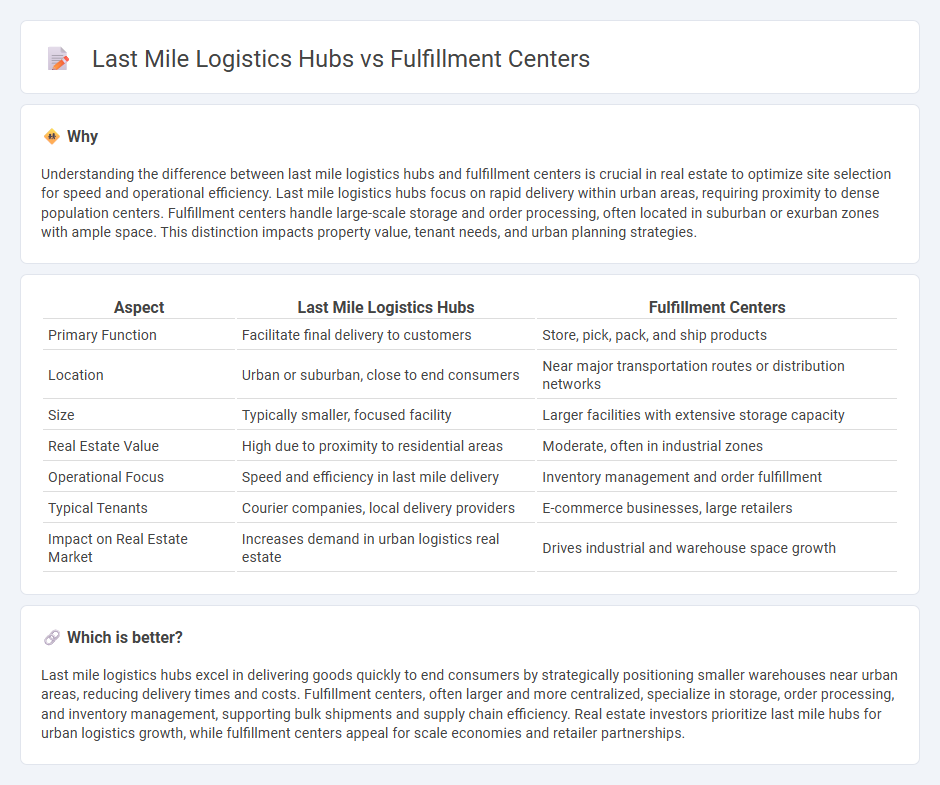
Last mile logistics hubs focus on efficient local delivery and storage of goods near end consumers, optimizing speed and convenience in urban areas. Fulfillment centers manage inventory on a larger scale, processing orders and handling packaging for nationwide or global distribution. Discover how these distinct real estate facilities impact supply chain strategies and urban development.
Why it is important
Understanding the difference between last mile logistics hubs and fulfillment centers is crucial in real estate to optimize site selection for speed and operational efficiency. Last mile logistics hubs focus on rapid delivery within urban areas, requiring proximity to dense population centers. Fulfillment centers handle large-scale storage and order processing, often located in suburban or exurban zones with ample space. This distinction impacts property value, tenant needs, and urban planning strategies.
Comparison Table
| Aspect | Last Mile Logistics Hubs | Fulfillment Centers |
|---|---|---|
| Primary Function | Facilitate final delivery to customers | Store, pick, pack, and ship products |
| Location | Urban or suburban, close to end consumers | Near major transportation routes or distribution networks |
| Size | Typically smaller, focused facility | Larger facilities with extensive storage capacity |
| Real Estate Value | High due to proximity to residential areas | Moderate, often in industrial zones |
| Operational Focus | Speed and efficiency in last mile delivery | Inventory management and order fulfillment |
| Typical Tenants | Courier companies, local delivery providers | E-commerce businesses, large retailers |
| Impact on Real Estate Market | Increases demand in urban logistics real estate | Drives industrial and warehouse space growth |
Which is better?
Last mile logistics hubs excel in delivering goods quickly to end consumers by strategically positioning smaller warehouses near urban areas, reducing delivery times and costs. Fulfillment centers, often larger and more centralized, specialize in storage, order processing, and inventory management, supporting bulk shipments and supply chain efficiency. Real estate investors prioritize last mile hubs for urban logistics growth, while fulfillment centers appeal for scale economies and retailer partnerships.
Connection
Last mile logistics hubs and fulfillment centers play a crucial role in optimizing real estate for efficient distribution networks, reducing delivery times in urban areas. Strategic placement of fulfillment centers near key transportation routes enhances the capacity of last mile hubs to manage inventory and streamline parcel sorting processes. This synergy supports the growing demand for rapid e-commerce deliveries, influencing real estate development trends focused on proximity and accessibility.
Key Terms
Inventory Management
Fulfillment centers centralize inventory management by storing large quantities of products to efficiently process and ship orders, reducing stockouts and improving order accuracy. Last mile logistics hubs specialize in rapid sorting and redistribution of inventory closer to end customers, enabling faster delivery times and real-time inventory tracking at a local level. Explore how integrating both approaches can optimize your supply chain and enhance customer satisfaction.
Proximity to End Customer
Fulfillment centers serve as large-scale warehouses that store inventory and process orders, strategically located near transportation nodes but not necessarily close to the end customer. Last mile logistics hubs prioritize proximity to consumers, enabling faster, cost-effective delivery and enhanced customer satisfaction through reduced transit times and improved service flexibility. Explore the critical differences and benefits of these facilities to optimize your supply chain efficiency.
Order Processing Speed
Fulfillment centers are large-scale warehouses designed for efficient order processing, picking, packing, and shipping, enabling rapid handling of bulk orders with advanced automation technologies. Last mile logistics hubs specialize in the final phase of delivery, focusing on quick sorting and dispatching to ensure speedy delivery within local areas, reducing transit time from hub to customer. Explore the key differences in operational strategies and technologies that boost order processing speed in both types of facilities.
Source and External Links
Fulfillment Center & Warehousing Services: Tips and Tactics - Fulfillment centers are specialized logistics hubs where inventory is stored, managed, and shipped directly to customers or retailers, often operated by third-party providers to handle the entire order fulfillment process for ecommerce sellers.
Fulfillment Center & Warehouse Services: Succeed With Both - A fulfillment center serves as the central point for all logistics needed to move products from sellers to customers, handling tasks like order picking, packing, labeling, and shipping, and can be managed in-house or by a 3PL provider.
Fulfillment centers: Everything you need to know - Fulfillment centers allow ecommerce businesses to outsource storage and shipping, offering faster processing, lower costs, and scalable operations without the need to maintain physical infrastructure or manage staff.
 dowidth.com
dowidth.com